Business & Politics
Seoul zeroes in on high tech for US business alliance
S.Korean President Yoon Suk Yeol's US visit comes as Washington calls on its allies to contain China's influence
By Apr 26, 2023 (Gmt+09:00)
6
Min read
Most Read
LG Chem to sell water filter business to Glenwood PE for $692 million


Kyobo Life poised to buy Japan’s SBI Group-owned savings bank


KT&G eyes overseas M&A after rejecting activist fund's offer


StockX in merger talks with Naver’s online reseller Kream


Mirae Asset to be named Korea Post’s core real estate fund operator


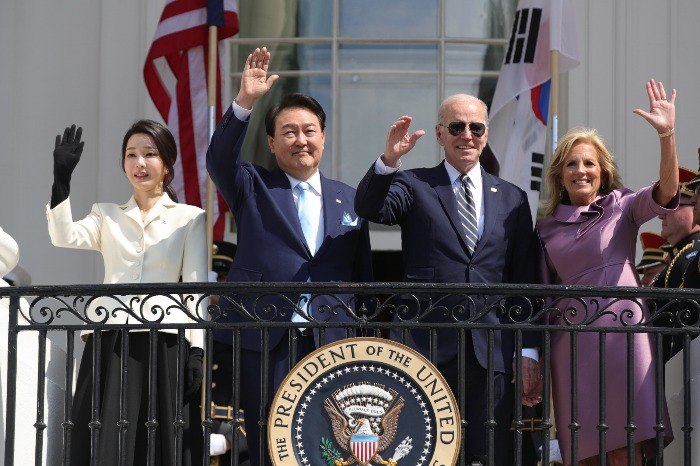
South Korean President Yoon Suk Yeol is off to a smooth start on his six-day state visit to the US this week, which is expected to pave the way for his efforts to strengthen both countries’ economic cooperation, particularly in leading-edge technologies.
This time around, their business partnership will pivot toward clean energy such as hydrogen fuels, nuclear energy and rechargeable batteries, on top of semiconductors, 5G networks and artificial intelligence.
In the first two days of his April 24-30 visit to Washington, major US companies including Corning Inc. and Netflix Inc. unveiled their Korea investment plans to the tune of $5.9 billion in aggregate, presidential economic secretary Choi Sang-mok told reporters.
Six high-tech US companies such as Air Products & Chemicals Inc., Plug Power Inc., a hydrogen fuel cell developer and Onsemi, a semiconductor manufacturer, pledged to invest a combined $1.9 billion in the world’s 10th largest economy during a Korea-US business roundtable meeting on Tuesday.
Korean companies led by Samsung, Hyundai, SK and LG are keen to join hands with US clean energy startups to enter the hydrogen and ammonia fuel markets, as well as in developing small nuclear reactors to meet tightening emission rules.
President Yoon emphasized the importance of cooperation to bolster high-tech industries and establish stable supply chains during the meeting with business leaders as he works to develop the two nations' alliance beyond security.
His official trip to the US comes as Washington is enlisting its allies’ support to contain China’s influence in advanced industries, while urging them to build more plants there to create jobs.
The $5.9 billion investment pledged by American companies includes $1.5 billion by Corning Inc. over the next five years.
Corning Chief Executive Wendell Weeks said during the roundtable meeting that the specialty glass and ceramics maker has so far invested a combined $100 billion in South Korea and created thousands of jobs.
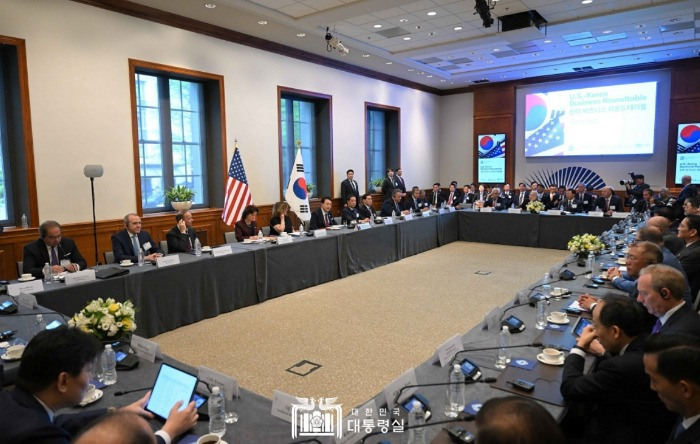
Netflix, a global streaming service, will invest $2.5 billion in South Korean content such as drama series, movies and reality shows for the following four years.
SMALL MODULAR REACTORS
High on the list of their business cooperation priorities are small modular reactors (SMRs) for nuclear power plants.
SK Group, South Korea’s No. 2 conglomerate, and state-run Korea Hydro & Nuclear Power Corp. will join forces with TerraPower, founded by Microsoft Co-founder Bill Gates. They will cooperate to develop and finance next-generation (SMR) technologies designed by TerraPower.
Their partnership will also cover TerraPower’s new technology NatriumTM SFR and the test-running of its fourth-generation SMR based on the sodium-cooled fast reactor.
SK is the largest shareholder of TerraPower after it invested $210 million in the US startup in August 2022.
Now SK and TerraPower are working on commercializing TerraPower’s SMRs by 2030, said SK Group Chairman Chey Tae-won during the roundtable meeting.
The SMR industry is eyed as one of the world's fast-growing markets. It is forecast to grow by an annual average of 22% to $300 billion by 2040, according to the World Economic Forum.
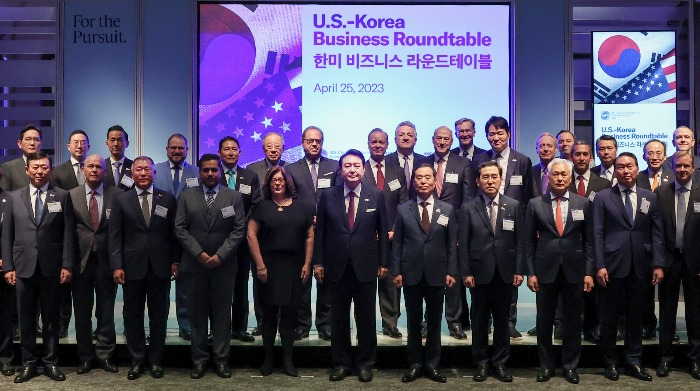
Doosan Enerbility Co., a leading South Korean power plant builder, has been working with NuScale Power Corp. to develop SMRs as well. It is a key shareholder of the SMR company, in which it invested $104 million.
Two other South Korean companies – Samsung C&T Corp. and GS Energy Corp. – also bought stakes in NuScale for $110 million. NuScale is the only company with SMR design technologies certified by the US Nuclear Regulatory Commission.
Doosan Enerbility will manufacture and supply SMRs designed by NuScale, financed by the Export-Import Bank of Korea. GS Energy Corp. will be in charge of operating the SMRs.
Separately, Hyundai Engineering & Construction Co. inked an agreement with Holtec International, a US energy equipment supplier, to build SMRs and ship them by March 2029 to Ukraine, still at war with Russia. Back in 2021, Hyundai Engineering and Holtec signed a joint SMR development deal.
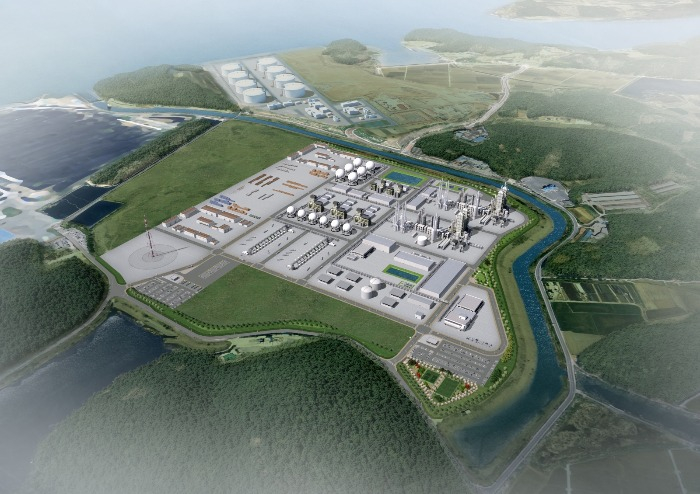
HYDROGEN ENERGY
As part of the economic delegation of President Yoon, Hyundai Motor Group Chairman Chung Euisun said the group is in talks to roll out hydrogen-powered fuel cell tractors with the US Environmental Protection Agency. He provided no further details.
HD Korea Shipbuilding & Offshore Engineering Co., an intermediary holding company under Hyundai Heavy Industries Group, plans to join hands with General Electric Co., Plug Power Inc. and SK E&S Co. to build the world’s largest blue hydrogen ecosystem in South Korea.
Under their non-binding agreement, they will invest a total of 6.7 trillion won ($5 billion) in the facility to produce, distribute and use 250,000 tons of blue hydrogen per year. The project is expected to create 105,000 jobs.
SK E&S will produce blue hydrogen mainly from natural gas, applying its carbon capture and storage technology. To produce carbon dioxide-free hydrogen, GE and Plug Power will utilize their hydrogen turbines and hydrogen fuel cell technologies. Plug Power is a US hydrogen fuel cell developer.
Lotte Chemical Corp. signed a memorandum of understanding with CF Industries Holdings Inc. to produce ammonia in the US state of Louisiana. CF Industries manufactures agricultural fertilizers.
BATTERIES
Regarding batteries, a top business agenda item between Seoul and Washington, South Korea will ramp up its production capacity in the US to cope with the Inflation Reduction Act (IRA), aimed at reducing American dependence on China.
Samsung SDI Co. on Tuesday said it would establish an EV battery joint venture with General Motors Co. in the US for $3 billion. Their joint plant will have an annual production capacity of 300 gigawatt hours (GWh) of batteries.
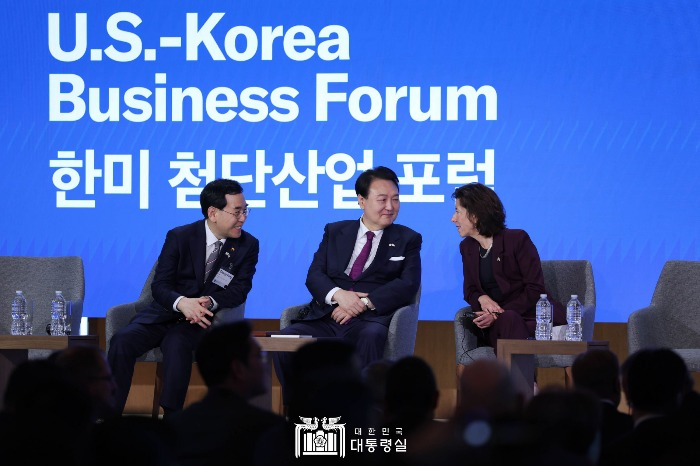
LG Energy Solution Ltd. will expand its battery production capacity to a combined 250 GWh in its joint facilities built with GM and Honda Motor Co. respectively, as well as its plants in Michigan and Arizona.
As they are jittery about the follow-up guidelines of the IRA, South Korea’s state-run institutes and battery industry associations are seeking to boost information sharing, technology cooperation and business networks with their US counterparts.
Accompanying President Yoon to Washington, senior officials from these organizations signed a preliminary agreement with US battery institutes to cooperate in developing next-generation batteries and recycling used ones.
The IRA requires that a certain percentage of battery components and their minerals be manufactured in and sourced from North America or its free trade partners for EVs powered by the batteries to qualify for US subsidies.
Over the past three years, US companies’ investments in South Korea have doubled, while South Korean firms more than tripled their spending in the world’s largest economy during the same period, according to Yoon.
For its part, LG Group Chairman Koo Kwang-mo said the group’s US sales, including those from home appliances, TV panels and EV batteries, are set to nearly double in five years from the current $30 billion.
Tesla Inc.’s supply chain head Karn Budhiraj said at the roundtable meeting that his company would team up with Korean companies to bump up EV sales.
Write to Byung-Uk Do, Jae-Fu Kim, Hyung-Kyu Kim and Il-Gue Kim at dodo@hankyung.com
Yeonhee Kim edited this article
More to Read
-
 Business & PoliticsS.Korea wary of tougher US anti-China moves for chipmakers
Business & PoliticsS.Korea wary of tougher US anti-China moves for chipmakersApr 24, 2023 (Gmt+09:00)
3 Min read -
 BatteriesKorean battery players LG, Samsung, SK sweep US EV tax credits
BatteriesKorean battery players LG, Samsung, SK sweep US EV tax creditsApr 19, 2023 (Gmt+09:00)
4 Min read -
 Electric vehiclesHyundai Motor seeks remedies after GV70 exclusion from US subsidies
Electric vehiclesHyundai Motor seeks remedies after GV70 exclusion from US subsidiesApr 18, 2023 (Gmt+09:00)
4 Min read -
 Business & PoliticsYoon’s US visit to test Biden’s trust as ally over chip, battery issues
Business & PoliticsYoon’s US visit to test Biden’s trust as ally over chip, battery issuesMar 08, 2023 (Gmt+09:00)
3 Min read -
 Korean chipmakersBiden hails SK Siltron’s investment in Michigan as 'game changer'
Korean chipmakersBiden hails SK Siltron’s investment in Michigan as 'game changer'Nov 30, 2022 (Gmt+09:00)
1 Min read
Comment 0
LOG IN


